Depression in UK Teens: Impacts and Recommendations
1. Introduction: Addressing Teen Depression in the UK
1.1 Research background
Depression is a common mental health issue which is identified as feelings of sadness, loneliness and changes in behaviours. The “Hopeless outlook” is identified as the first stage of depression, which helps to determine the health issue. In 2021, up to 10.1% of teenagers suffer from depression, and the results identified this as a social health issue (Digital.nhs.uk, 2022). Besides this, approximately 21.8% of teenagers aged up to 17 years have experienced an improvement in their state of depression. Therefore, depression is identified as a serious issue in the UK among adolescent groups; the issues may be managed effectively. The reports of the UK show that depression is most commonly identified in the age group of 12-25 years (Digital.nhs.uk, 2022). The identification of present issues in the UK may help to develop the research effectively. In addition, in 2021, up to 41% of the population of the UK is sharing that those people feel depressed (Statista.com, 2022). Therefore, depression is a public health issue in the UK, which may affect mental health besides physical health.
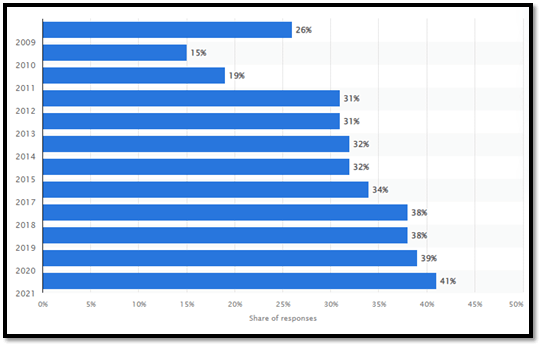
Figure 1: Rate of depression among young people in the UK
1.2 Problem statement
The research will identify the impacts of depression as up to 10.1% of adolescents are experiencing depression, and those influenced their health negatively. The study will develop by focusing on the mental health issue of depression among teenagers in the UK. Based on the present issues, the whole study will develop the identified actual impacts and evaluate strategic support.
1.3 Aims and Objectives
The aim of the study is to evaluate depression among teenagers in the UK and the impacts of depression on their mental health.
The objectives of the study are identified below;
- To identify the number of cases of depression among teenagers in the UK
- To evaluate different causes of depression
- To examine the impacts of depression on teenagers in the UK
- To develop recommendations for identified issues associated with depression in teenagers
1.4 Rationale
Depression is identified as a major mental health issue in the UK, and the development of the present study may help to identify potential issues of the present health problem. Additionally, the rate of depression rose compared to previous years, which may arise with some common issues which will be identified in the present research process. In the year 2018, the rate of depression was 38% which will rise in 2021 and become 41% (Statista.com, 2022). In the critical analysis of the rate of depression that is identified, issues of depression and its impacts rise more than in previous times. Therefore, the study will focus on the issues and impacts of depression among teenage people in the UK. The study will help to determine the actual issues and impacts, which may help teenagers to understand the negative impacts of depression (Finning et al. 2020). A theoretical analysis of the mental issue will be developed, which will help to identify strategic recommendations for the health issue for teenagers.
1.5 Dissertation structure
The research has been developed with the use of some chapters, such as an introduction where the aim and objectives of the study are identified. The existing literature on the present topic is analysed in the Literature review, and data collection methods are identified in Methods. The findings and discussion help to identify outcomes.
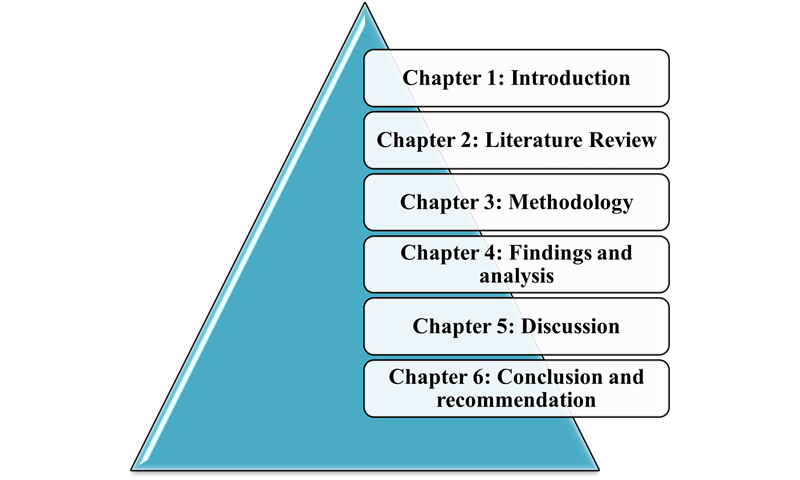
Figure 2: Structure of dissertation
Don't let deadlines stress you out – our online assignment help offers you professional guidance tailored to your needs, guaranteeing top-notch results.
2. Literature Review
2.1 Depression among teenagers
The adolescent age group or teenage people have faced issues with depression, which is a mental health issue in the UK. According to the view of Achterbergh et al. (2020), the feelings, behaviour and thinking of teenagers are impacts of the mental, emotional and physical situations of the teenagers which cause depression. In addition, “Feelings of sadness, Frustration, hopelessness, and Low self-esteem” are identified as some common symptoms which may lead to behavioural and emotional changes. In addition, various risk factors are associated with depression which is identified as a serious issue among teenagers in the UK. As per the view of Bornioli et al. (2021), “physical, emotional and social changes” happen due to the presence of depression among teenagers. On the other side, mental and emotional disorders, which cause various changes, are identified as depression in teenagers, which may result in adult depression. In the critical analysis that is identified depression is commonly identified in the adolescent group of the UK.
The situation is caused by various risk factors such as “chronic stress, trauma, poor nutrition, medication and substance use and family history”.
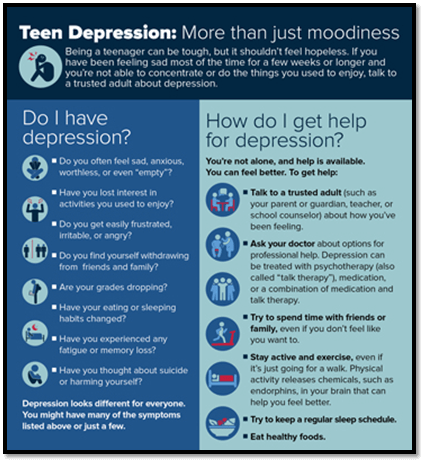
Figure 3: Depression in teenagers
2.2 Impacts of depression on mental health
Individuals suffering from the presence of depression impact their health which develops serious issue of physical issues. As stated by El Asam et al. (2019), feelings of guilt and hopelessness develop into a serious situation of depression, and those impacts directly affect the menstrual situation and health of an individual. On the other hand, “emotional, behavioural and health problems” are increased among teenagers in the UK due to high rates of depression among adolescent groups. According to the view of Finning et al. (2020), emotional disorders may lead to health issues among teenage people for the presence of depression in teens. Additionally, an increased chance of suicidal behaviour has been identified in the people or teenage people who have suffered from depression. In the critical analysis that is identified, emotional situations are decreased as the mental health impacts of depression in teenagers.
2.3 Theoretical Framework
Social Cognitive Theory
This theory is also well known as Social Learning Theory and it is influencing the experiences of an individual, their actions and all environmental functions which are changing an individual’s behaviour. As opined by Ibrahim et al. (2019), the five major concepts of Social Cognitive Theory are Observation, Attention, Retention, Motivation and Reproduction. In addition, this is effective in changing an individual’s behaviour by motivating and encouraging them to take part or act positively. Similarly, as depicted by Matthews (2019), sociocultural factors and self-efficacy are interrelated with each other. However, the outcome expectations, behaviour and desired goals are directly associated with others. Moreover, the factors of this theory assist teenagers in leading a healthy and normal lifestyle.
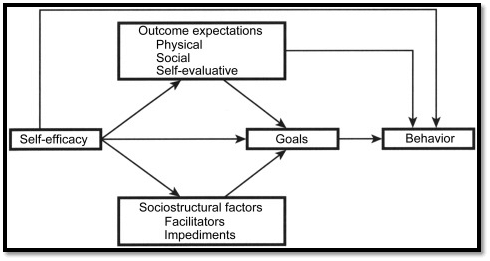
Figure 4: Social Cognitive Theory
Labelling Theory
This theory claims that individuals are obtaining labels from teenager’s behaviours and tendencies. In addition, every individual is becoming aware of their behaviour changes and it is affecting their lifestyles and mental state. As stated by Beauchamp et al. (2019), the labelling theory believes that the deviances are made worse with the assistance of punishments and labelling by all authorities. Wang et al. (2019) argue that the Labelling theory is entirely dependent with the mental state of criminals. However, this specific theory is applied in terms of understanding the mental state of teenagers and other mentally affected individuals.

Figure 5: Labelling Theory
2.4 Literature Gap
The literature is mainly focused on the physical issues along with mental issues of teenagers who suffer from depression. In addition, the present study will develop on impacts of depression on mental health and the selection of the articles is developed issues. The literature is focused on the previous situation of depression and those less focused on the present issues, which developed issues in the critical analysis process (Perry et al. 2020). Besides this, physical issues are more focused, which developed issues in the selection of the articles for the present study development process. Therefore, the present study will identify these gaps and mitigate those gaps with the present analysis process.
3. METHODOLOGY
3.1 Methodological outlines
| Research Paradigm | Paradigm Name |
| Research Philosophy | Interpretivism |
| Research Approach | Inductive |
| Research Design | Descriptive |
| Data Collection Process | Secondary Data Collection |
| Data Analysis Method | Systematic data analysis with Thematic Tool |
| Critical Appraisal tool | CASP |
Table 1: Methodological Outline
Analysis (h5)
The above table has highlighted the research paradigms which will be applied in this specific study. All those paradigms play a crucial role in assembling authentic information with proper data collection methods and interpreting them adequately (Walter and Ophir, 2019). This study will be developed in a Systematic way. It is assisting in recognizing the efficient means of this study by generating consistent and giving optimum results (Sileyew, 2019). The Interpretivism Research Philosophy will be selected in this study and it will be beneficial in interpreting the assembled data in a subjective way. Besides that, the Inductive Research Approach and Descriptive Research Design will be chosen to develop this study adequately. The selected philosophy, approach and design are assisting in gathering authentic, expert opinions and accurate data to complete this study properly (Alharahsheh and Pius, 2020). In order to assemble all data, the Secondary Data Collection Tool will be selected by which accurate information will be gathered. After collecting all secondary data, they can be analyzed with the help of the Thematic Analysis Process with the help of the thematic tool. Thus, it can be said that selecting or recognizing accurate research paradigms is beneficial in completing and developing a study accurately.
3.2 Data collection method
This specific study can be developed by the Secondary Data Collection Procedure. In addition, this data collection method is effective in collecting accurate and unbiased information. Henceforth, accurate data will be gathered based on the impact of Depression on Teenager’s mental health. All secondary data will be assembled with the help of secondary resources such as journals, articles and online websites. Some databases such as Google Scholar, PubMed, ProQuest and Government approved websites will be chosen to assemble authentic information. All those databases are helpful in developing and completing a study with expert opinions and accurate data (Coe et al. 2021). The PRISMA Framework will be chosen to screen all articles in a proper way. This framework is effective in eliminating all duplicate and biased articles hence; it is helping to complete the study informatively (Hawkins et al. 2020). Apart from that, keywords such as depression, teenagers' mental health and the impact of depression on teenagers’ mental health will be applied in terms of selecting articles and journals. Moreover, approximately 10 articles will be chosen by using the PRISMA framework. Boolean operators like AND, NOT and OR will be used to search articles from the databases.
3.3 Data analysis methods
After assembling secondary data, they will be interpreted and analyzed properly to complete this study to be more informative. The Thematic Qualitative Analysis process will be chosen in terms of analyzing the secondary data. The thematic analysis method is beneficial in terms of addressing the study in a subjective way (Braun and Clarke, 2019). The themes in this study will be developed by relating to the objectives and aim of this study. The quality of all secondary data will be appraised with the help of the CASP tool. This specific tool is helpful in appraising the limitations and strengths of qualitative research methods. This tool contains around 10 questions which focus on various methodological aspects of a qualitative study. Therefore, it can be said that both the CASP tool and the thematic analysis tool will be helpful in analyzing and appraising the quality of qualitative data of systematic review.
3.4 Ethical Considerations
All assembled data will require maintaining several kinds of ethics and it can be helpful in maintaining confidentiality and security. All guidelines of the Data Protection Act 2018 will be followed to secure data and avoid data theft incidents. This specific data protection act is beneficial in securing all data which are stored and maintaining confidentiality (Legislation, 2022). After assembling all data, they will be stored in Google Drive and the authors will be sent requests to access all articles and complete this study informatively. Storage devices are essential in avoiding data stealing incidents and easy access from any place (Sundler et al. 2019). Additionally, all assembled data will be destroyed after applying them within six months.
4. EXPECTED OUTCOME
4.1 Outcomes
The expected outcome of this specific study is that this study plays an essential role by highlighting the information about the impact of depression on teenagers’ mental health. In this regard, this study can be beneficial to gather all kinds of authentic information regarding depression and its impact on teenagers’ mental states and lifestyles. Moreover, this study will be beneficial in terms of getting to know regarding the prevalence rate of teenagers who are living with depression and unable to lead a normal lifestyle.
4.2 Gantt chart
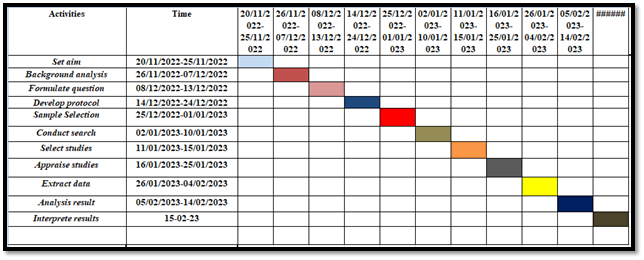
Figure 4: Timeline
Reference
Books
Coe, R., Waring, M., Hedges, L.V. and Ashley, L.D. eds., 2021. Research methods and methodologies in education. Sage.
Sileyew, K.J., 2019. Research design and methodology (pp. 1-12). Rijeka: IntechOpen.
Journals
Achterbergh, L., Pitman, A., Birken, M., Pearce, E., Sno, H. and Johnson, S., 2020. The experience of loneliness among young people with depression: a qualitative meta-synthesis of the literature.BMC psychiatry,20(1), pp.1-23.
Alharahsheh, H.H. and Pius, A., 2020. A review of key paradigms: Positivism VS interpretivism. Global Academic Journal of Humanities and Social Sciences, 2(3), pp.39-43.
Beauchamp, M.R., Crawford, K.L. and Jackson, B., 2019. Social cognitive theory and physical activity: Mechanisms of behavior change, critique, and legacy. Psychology of Sport and Exercise, 42, pp.110-117.
Bornioli, A., Lewis-Smith, H., Slater, A. and Bray, I., 2021. Body dissatisfaction predicts the onset of depression among adolescent females and males: a prospective study.J Epidemiol Community Health,75(4), pp.343-348.
Braun, V. and Clarke, V., 2019. Reflecting on reflexive thematic analysis. Qualitative research in sport, exercise and health, 11(4), pp.589-597.
El Asam, A., Samara, M. and Terry, P., 2019. Problematic internet use and mental health among British children and adolescents.Addictive behaviors,90, pp.428-436.
Finning, K., Ford, T., Moore, D.A. and Ukoumunne, O.C., 2020. Emotional disorder and absence from school: findings from the 2004 British Child and Adolescent Mental Health Survey.European child & adolescent psychiatry,29(2), pp.187-198.
Hawkins, M., Cheng, C., Elsworth, G.R. and Osborne, R.H., 2020. Translation method is validity evidence for construct equivalence: analysis of secondary data routinely collected during translations of the Health Literacy Questionnaire (HLQ). BMC medical research methodology, 20(1), pp.1-13.
Ibrahim, N., Amit, N., Shahar, S., Wee, L.H., Ismail, R., Khairuddin, R., Siau, C.S. and Safien, A.M., 2019. Do depression literacy, mental illness beliefs and stigma influence mental health help-seeking attitude? A cross-sectional study of secondary school and university students from B40 households in Malaysia. BMC public health, 19(4), pp.1-8.
Matthews, S., 2019. Self-Stigma and addiction. In The Stigma of Addiction (pp. 5-32). Springer, Cham.
Perry, B.I., Khandaker, G.M., Marwaha, S., Thompson, A., Zammit, S., Singh, S.P. and Upthegrove, R., 2020. Insulin resistance and obesity, and their association with depression in relatively young people: findings from a large UK birth cohort.Psychological medicine,50(4), pp.556-565.
Sundler, A.J., Lindberg, E., Nilsson, C. and Palmér, L., 2019. Qualitative thematic analysis based on descriptive phenomenology. Nursing open, 6(3), pp.733-739.
Walter, D. and Ophir, Y., 2019. News frame analysis: An inductive mixed-method computational approach. Communication Methods and Measures, 13(4), pp.248-266.
Wang, S., Hung, K. and Huang, W.J., 2019. Motivations for entrepreneurship in the tourism and hospitality sector: A social cognitive theory perspective. International Journal of Hospitality Management, 78, pp.78-88.



